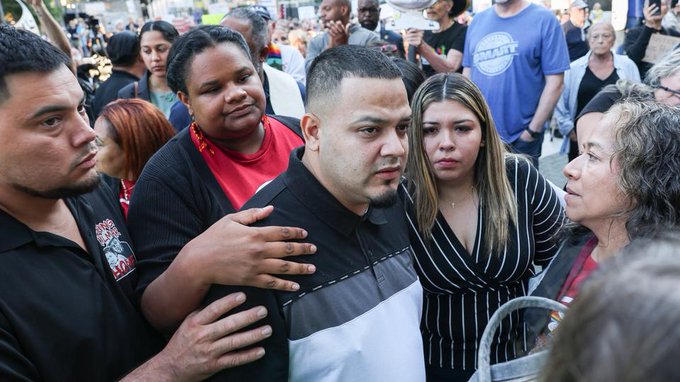By Mathew Owino
Published: August 25, 2025
The saga of Kilmar Armando Abrego Garcia, a 30-year-old Salvadoran immigrant and Maryland resident, has gripped the United States, igniting debates over immigration policy, due process, and the rule of law. On Monday, August 25, 2025, Abrego Garcia was detained by U.S. Immigration and Customs Enforcement (ICE) during a scheduled check-in at their Baltimore field office, just days after his release from criminal custody in Tennessee. This latest development marks another chapter in a high-profile case that has seen a wrongful deportation, a Supreme Court order, and allegations of government coercion. Street.co.ke delves into the complexities of this case, exploring its implications for immigrants, U.S. policy, and the global stage.
The Background: A Tale of Resilience and Controversy
Kilmar Abrego Garcia’s story begins in El Salvador, where he grew up amidst gang violence. Fleeing death threats at age 16, he illegally entered the United States in 2011, seeking safety. By 2019, an immigration judge granted him withholding of removal status due to the credible fear of persecution by gangs like Barrio 18 if returned to El Salvador. This status allowed him to live and work legally in Maryland, where he settled with his American citizen wife, Jennifer Vasquez Sura, and their children. As a sheet metal apprentice and member of SMART Local 100, Abrego Garcia embodied the American Dream, contributing to the construction industry and complying with annual ICE check-ins.
However, on March 12, 2025, his life took a dramatic turn. While driving home from work in Baltimore with his son, ICE officers detained him, citing alleged ties to the MS-13 gang. Despite his protected status, he was deported to El Salvador on March 15, landing in the notorious Terrorism Confinement Center (CECOT), a mega-prison known for harsh conditions. This move violated a 2019 court order, sparking outrage and a legal battle that reached the U.S. Supreme Court.
The Legal Battle: A Test of Due Process
Abrego Garcia’s deportation was deemed an “administrative error” by ICE, but the Trump administration initially resisted court orders to facilitate his return. His wife filed a lawsuit in Maryland, and on April 10, 2025, the Supreme Court unanimously ruled that the government must bring him back, with Justice Sonia Sotomayor calling his removal “illegal.” U.S. District Judge Paula Xinis in Maryland ordered expedited discovery, demanding government documents and depositions to probe the deportation’s circumstances, raising the specter of contempt charges.
Despite initial defiance, the Trump administration reversed course in June, returning Abrego Garcia to the U.S. to face criminal charges in Tennessee for allegedly transporting undocumented migrants. The 10-page indictment, unsealed on June 6, 2025, accused him of participating in a smuggling ring, transporting migrants from Texas to Maryland over nine years, and involvement with firearms and drugs. He pleaded not guilty, with his lawyers calling the charges an “abuse of power” to justify his earlier deportation.
On August 22, 2025, U.S. Magistrate Judge Barbara Holmes in Tennessee ordered his release from criminal custody, finding no evidence he posed a danger or flight risk. However, concerns persisted that ICE would swiftly detain him again. Judge Xinis intervened, barring immediate ICE custody in Tennessee and ordering his return to Maryland under supervised release, with a 72-hour notice requirement for any deportation proceedings to a third country.
The Latest Twist: ICE Detention in Baltimore
On August 25, 2025, Abrego Garcia reported to ICE’s Baltimore field office as part of his release conditions. Upon arrival, he was detained without explanation, according to his attorney, Simon Sandoval-Moshenberg. ICE officers refused to disclose the detention’s reason or the facility where he would be held, prompting a new lawsuit filed in Maryland to challenge this action. This move came just 72 hours after his release from Tennessee, intensifying accusations of government overreach.
The detention follows a controversial plea offer. On August 24, Abrego Garcia’s lawyers revealed that the Department of Justice (DOJ) and Department of Homeland Security (DHS) had pressured him to plead guilty to smuggling charges in exchange for deportation to Costa Rica. Refusal, they claimed, would lead to deportation to Uganda—a country with no ties to Abrego Garcia, raising fears of persecution or indirect return to El Salvador. His attorneys described this as coercion, arguing it violates due process by forcing a choice between a guilty plea and potential harm.
The Broader Context: Immigration Policy Under Fire
Abrego Garcia’s case has become a lightning rod for criticism of the Trump administration’s immigration policies. Advocates argue it exemplifies a broader pattern of disregarding due process, particularly in mass deportation efforts. Over 200 others were deported alongside Abrego Garcia to CECOT, many with no criminal records or lawful U.S. status, highlighting systemic issues. The administration’s reliance on unverified gang affiliations—based on flimsy evidence like Abrego Garcia’s clothing (a Chicago Bulls hat and a hoodie)—has drawn scrutiny. Experts like Steven Dudley, who studies MS-13, caution that such symbols are unreliable indicators of gang membership.
The case also underscores tensions between the executive and judicial branches. The administration’s initial defiance of court orders raised concerns of a constitutional crisis, with critics accusing it of weaponizing immigration enforcement to silence dissent. A whistleblower from the DOJ resigned in protest over the indictment, and Senator Chris Van Hollen of Maryland visited Abrego Garcia in El Salvador to verify his condition, slamming the government’s actions as “asserting a right to stash away residents in foreign prisons without due process.”
Public reaction on social media platforms like X reflects deep division. Supporters of Abrego Garcia, including immigrant rights groups like CASA, celebrated his brief return to Maryland, with videos showing family reunions. Conversely, critics label him a “human trafficker” and “gang member,” citing allegations of domestic abuse from a 2021 protective order (later withdrawn by his wife) and uncharged claims of a murder in El Salvador. These narratives, often amplified by political figures like Homeland Security Secretary Kristi Noem, fuel polarized sentiments.
Implications: A Symbol of Resistance or a Political Pawn?
For the immigrant community, Abrego Garcia’s ordeal is a chilling reminder of vulnerability. His status as a union member and father of three has made him a symbol of the broader struggle for fair treatment. Labor unions, like SMART, and community organizations argue that his case threatens all workers, as unchecked ICE actions could target anyone. The construction industry, where immigrants make up 36% of the workforce, sees his detention as a blow to efforts to integrate diverse talent into skilled trades.
Politically, the case is a double-edged sword. For the Trump administration, bringing Abrego Garcia back to face charges was an attempt to save face after defying court orders. The Uganda deportation threat, however, risks further backlash, with legal experts warning it could violate international human rights standards. For advocates, his detention galvanizes calls for immigration reform, emphasizing the need for transparent, fair processes.
Globally, the involvement of Salvadoran President Nayib Bukele adds complexity. Bukele’s cooperation in returning Abrego Garcia after an arrest warrant suggests diplomatic alignment with the U.S., but his initial refusal to release him from CECOT raised questions about sovereignty and human rights. The potential Uganda deportation further complicates matters, as it could strain U.S. relations with third countries.
What’s Next? A Legal Marathon Continues
As Abrego Garcia awaits his fate in ICE custody, his legal team is fighting on multiple fronts. The new Maryland lawsuit aims to block any deportation, particularly to Uganda, arguing it endangers his safety. His criminal trial in Tennessee, set for January 2026, could result in a life sentence if convicted, with prosecutors claiming he transported “50 undocumented aliens per month” over years. Yet, his lawyers maintain the charges are retaliatory, pointing to the DOJ’s whistleblower and inconsistencies in evidence.
For ordinary Americans and global observers, this case tests the U.S.’s commitment to justice. Will Abrego Garcia receive a fair trial, or will political pressures prevail? From the streets of Baltimore to the corridors of power, his story resonates, reminding us that immigration is not just policy—it’s personal. Street.co.ke will keep you updated as this saga unfolds.

